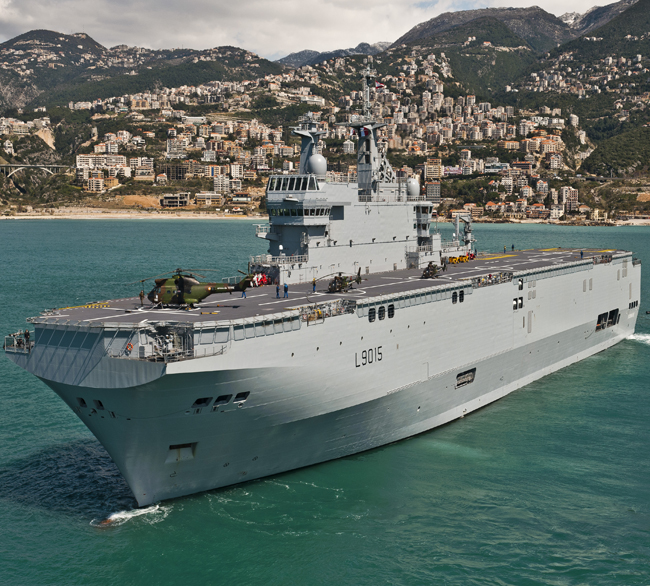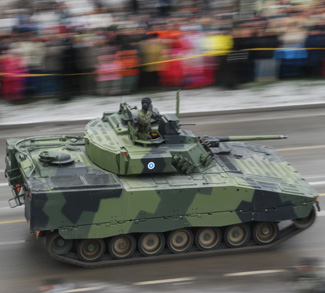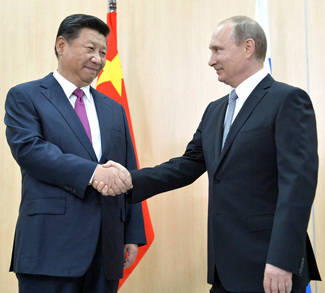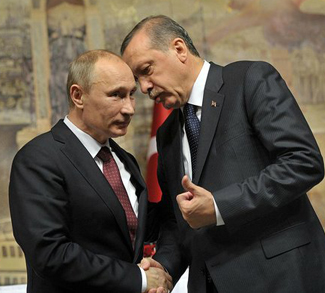France has agreed to sell two Mistral-class LHD to Egypt, a transaction estimated at more than 950 million euros. After the failed transaction with Russia due to the ongoing situation in Ukraine, the fate of the Mistrals was involved in many rumors, including a possible sale to Canada.
Reuters reported that French officials confirmed the deal on September 23, 2015. French President Francois Hollande addressed reporters stating that France and Egypt came to an agreement on the sale of the Mistral.
“We unwound the contract we had with Russia, on good terms, respectful of Russia and not suffering any penalty for France,” Hollande told reporters on arrival at an EU summit in Brussels.
“Yesterday, I agreed the price and conditions of this sale with (Egyptian) President (Abdel Fattah al-) Sisi and so France will ensure the delivery of these ships without losing anything, while helping protect Egypt.”
In June 2015, Egypt acquired a FREMM Aquitaine-class vessel from France, followed by the Egyptian Air Force taking delivery of the first three Rafales fighters of a 25 plane deal in July 2015. Now in September, the Mistral deal has been concluded, suggesting that Egypt has a penchant for French-made military hardware, leading to the possibility of more lucrative contracts for French companies.
The sale of the two Mistral-class LHD will significantly contribute to the growing relationship between Russia and Egypt. Although Russia has lost a valuable contract, the fact that Egypt bought the two LHDs enable them to enhance military cooperation and interoperability with Cairo. It is clear that both countries will take advantage of this transaction, but for different reasons.
Russian Advisors Aboard the Mistral
Once the Egyptian Navy deem the two Mistrals operational, it is probable that Russia will offer to deploy advisors to share their expertise in operating the vessels—even with limited experience at sea with the Mistrals—to the Egyptian sailors. The fact that Russian soldiers were training on the Mistral will greatly benefit the newly-established Egyptian crew.
If aboard, Russian advisors will most likely have access to the entire ship and could pass technical information of the vessel to national shipbuilders; a move that would enable Russian shipbuilders to work on a similar version of the Mistral.
A Russian version of the Mistral could also benefit Egypt. Russia will most likely provide equipment for the Mistral to Egypt as they were ready to take delivery of the first Mistral when the deal began to waver and as such, already have systems ready for use by the vessels. They may also develop new technologies that could be deployed on the Egyptian Mistral in the future.
Russia Sells 50 Ka-52 to Egypt
After the failed contract between Russia and France, fifty Ka-52 helicopters were left unused. Fortunately for Russia, Egypt purchased the whole fleet of Ka-52 and are considering the deck-version for seaborne operations aboard their newly-purchased Mistral-class LHD.
The Ka-52 Alligator is “a next-generation reconnaissance and combat helicopter designed to destroy tanks, armored and non-armored ground targets, and enemy troops and helicopters both on the front line and in tactical reserves. The helicopter can operate around the clock and in all weathers. The Ka-52 can provide target acquisition and designation for helicopter teams and ground troop command and control centers. It can also provide fire support for troop landings, fly routine patrols, and escort military convoys.”
Well-connected sources in the Russian defense industry told TASS that Russia could possibly supply the sea-based version of the Ka-52: “An agreement on the supply of fifty Ka-52 helicopters has been signed,” he said. “If the Egyptian side finds it necessary, the sea-based version of the helicopters will be supplied.”
That said, the Ka-52K has been specifically designed for seaborne operations. The first delivery is expected between 2017 and 2018.
Russian helicopters rotorcraft manufacturer and Russia’s Defense Ministry said that the Ka-52K would be deployed on other Russian Navy ships instead of the Mistral.
Nevertheless, it is almost certain that Russia will agree to sell Ka-52K helicopters to Egypt, reopening the door to more contracts from the Egyptian military.
Russia’s Presence in the Middle East
In the lead up to the sale of the Mistrals to Egypt, Russia has been appearing in the region quite frequently. Russia has been concluding paratrooper training exercises in Egypt, talked about Syria with Israeli Prime Minister Benjamin Netanyahu, and increasing its presence in Syria. The increased presence, coinciding with the sale of the Mistrals as well as the continuing deterioration of the situation in Syria, provides Russia the opportunity to unnerve the West while doing little that can be perceived as threatening. We have seen an increased presence by NATO forces in Europe, particularly on exercise, in response to Ukraine, while simultaneously gradually reducing their presence in the Middle East. By refocusing their deployments to Syria and conducting such exercises in the region, Moscow has effectively told the West that they are ready to fill the vacuum a lessened coalition presence will create, though they remain open to cooperation.
The question NATO needs to ask themselves is: If the low levels of cooperation with Russia remain, can they live with an increased Russian political and military presence in the Middle East? After all, the CSTO, much like NATO, is capable of deploying abroad with their rapid reaction force, and with the increase in extremist influence in CSTO members, may provide enough reason for their deployment if Western commitment remains low.
Through relationship building in the Middle East, Russia is positioning itself well regardless of how events in Syria evolve. Despite their vested interest in keeping Assad in power, improving cooperation with the other regional powers and ensuring mutual interests are protected provide Moscow with the best outcome in the Middle East, while likely keeping NATO involved there rather than in Europe.




